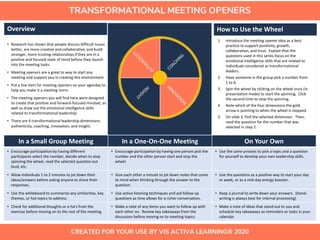
Transformational Meeting Openers
- 1. • Research has shown that people discuss difficult issues better, are more creative and collaborative, and build stronger, more trusting relationships if they are in a positive and focused state of mind before they launch into the meeting tasks. • Meeting openers are a great to way to start any meeting and support you in creating this environment. • Put a line item for meeting openers on your agendas to help you make it a meeting norm. • The meeting openers you will find here were designed to create that positive and forward-focused mindset, as well as draw out the emotional intelligence skills related to transformational leadership. • There are 4 transformational leadership dimensions: authenticity, coaching, innovation, and insight. In a Small Group Meeting In a One-On-One Meeting On Your Own • Encourage participation by having different participants select the number, decide when to stop spinning the wheel, read the selected question out loud, etc. • Encourage participation by having one person pick the number and the other person start and stop the wheel. • Use the same process to pick a topic and a question for yourself to develop your own leadership skills. • Allow individuals 1 to 2 minutes to jot down their ideas/answers before asking anyone to share their responses. • Give each other a minute to jot down notes that come to mind when thinking through the answer to the question. • Use the questions as a positive way to start your day or week, or as a mid-day energy booster. • Use the whiteboard to summarize any similarities, key themes, or hot topics to address. • Use active listening techniques and ask follow up questions as time allows for a richer conversation. • Keep a journal to write down your answers. (Hand- writing is always best for internal processing) • Check for additional thoughts or a-ha’s from the exercise before moving on to the rest of the meeting. • Make a note of any items you want to follow up with each other on. Review key takeaways from the discussion before moving on to meeting topics. • Make a note of ideas that stand out to you and schedule key takeaways as reminders or tasks in your calendar. 1. Introduce the meeting opener idea as a best practice to support positivity, growth, collaboration, and trust. Explain that the questions used in this series focus on the emotional intelligence skills that are related to individuals considered as transformational leaders. 2. Have someone in the group pick a number from 1 to 6. 3. Spin the wheel by clicking on the wheel once (in presentation mode) to start the spinning. Click the second time to stop the spinning. 4. Note which of the four dimensions the gold arrow is pointing to when the wheel is stopped. 5. On slide 3, find the selected dimension. Then, read the question for the number that was selected in step 2. Overview How to Use the Wheel
- 3. Model Authenticity Coach for Growth 1. Which of your coworkers / family members do you most appreciate today, and why? 2. What are you looking forward to accomplishing this week? 3. What’s one leadership trait you always admire in others? In what ways can you model this trait for others? 4. What is one thing you personally witnessed this past week that built your faith in humanity? 5. Which of your strengths do you feel are most important to bring out right now? 6. What is the image you want others to have of you this week? 1. What example do you have of helping someone out recently that felt good to be able to do? 2. Who’s the best coach you ever had? What made them so great? 3. What’s one piece of advice you got from a mentor that has stuck with you? How do you use that advice? 4. What have you discovered this past week that would apply to what we’re working on today? 5. What’s one issue are you currently working on, and what have you learned that is helping you move forward? 6. What would you like to learn today? Spur Innovation Provide Insight 1. What is one thing you’re trying to do differently in your work / project / life right now? What ideas have you tried that are working so far? 2. What’s one new experience you’ve had recently that has led to a positive shift in your perspective? 3. In what ways have you needed to adapt your approach recently? How has this helped you grow as a person and/or leader? 4. What is a recent challenge you faced, and how did you overcome this? How will you use this to help others? 5. What is one work challenge you’re facing right now and how can this group help? 6. What’s one innovation you’ve read about recently that has you excited, curious and/or inspired? 1. What is something you like to do to get or keep yourself motivated? 2. What values do you feel our team/our company demonstrate that are most important to you? 3. What is one thing you find challenging about this project/work? What is one thing about this project/work that you enjoy? 4. What were you passionate about when you were young? How does that show up in your life now? 5. What has been the highlight of your week so far? 6. What do you want to accomplish today that will allow you to feel as productive as possible? How can this group help?